What 1,000+ Industry Comments on Reddit Reveal About AI Search Optimization
After analyzing hundreds of comments across SEO subreddits, Manic.agency finds that the industry splits cleanly: early adopters racing to crack AI visibility versus skeptics dismissing "LLM SEO" as repackaged bullshit. The data tells a more nuanced story.
The Core Conflict
Traditional SEOs firms hold firm that "AI SEO = SEO." This view dominated 42% of analyzed comments. Google's Gary Illyes also recently confirmed it at Search Central Live 2025: AI Overviews use identical ranking systems. Does this settle the matter for all?
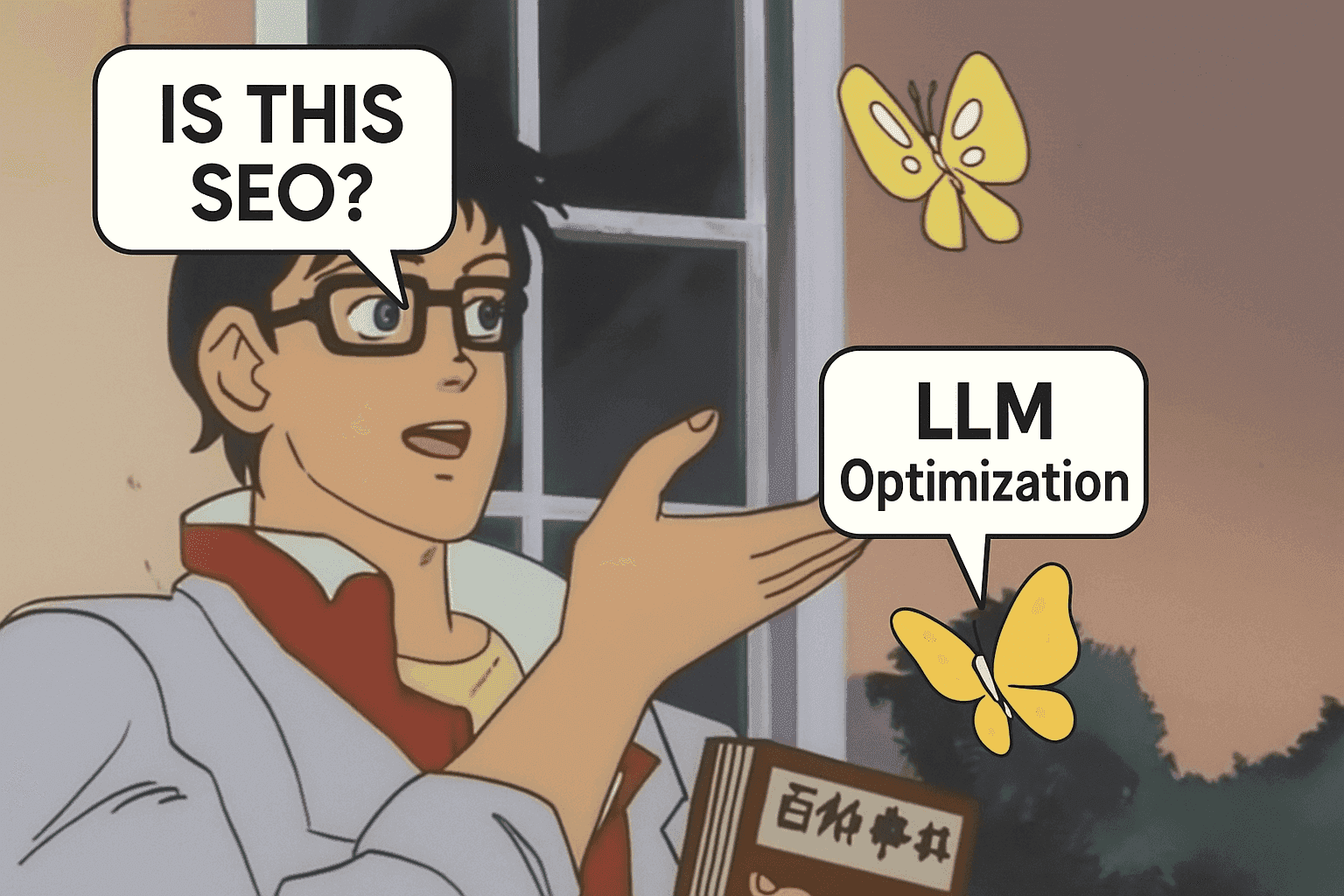
Not really; practitioners tracking actual AI traffic report fundamentally different patterns. Traditional metrics show quite low correlation with AI visibility: Domain Authority (0.326), backlinks (0.218), organic traffic (0.274). Meanwhile, brand mentions hit 0.664 correlation.
Content depth delivers 10x more citations at 10,000+ words versus 3,900.
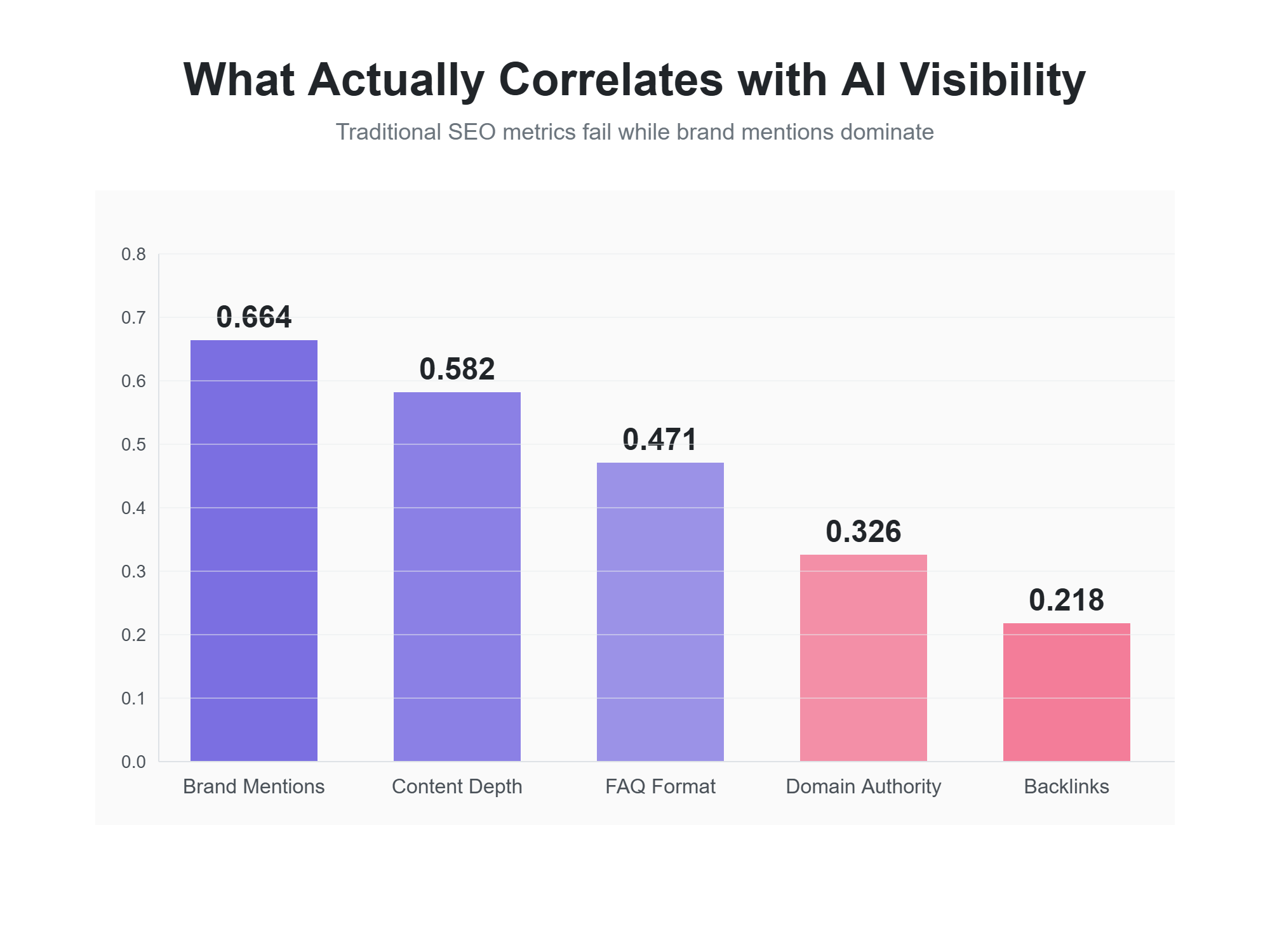
The subreddits we researched comprised mostly of those specifically related to SEO, and content creation in regards to SEO, overlapping with some general entrepreneurial and startup subreddits. This creates a certain bias for industry experts by design while allowing for more holistic viewpoints / generalists to creep in.
These are the subreddits that we chose to scrape select threads from: r/SEO, r/SEO_Digital_Marketing, r/startups, r/indiehackers, r/Entrepreneur, r/PPC, r/DigitalMarketing, r/Blogging, r/SEO_Experts, r/seogrowth, r/SEO_for_AI, r/SaaSMarketing.
One practitioner from our sources drops an automation confession that we've all suspected or have seen anecdotally or in practice:
"We built an AI agent that handles reddit marketing on autopilot - tracks keywords, finds relevant discussions, engages naturally. Way cheaper than agencies and runs 24/7. The process is completely automated. It identifies threads, crafts responses that add value while mentioning our brand naturally, and even varies writing styles to avoid detection. We're seeing brand mentions in ChatGPT responses after about 3 weeks of consistent activity."
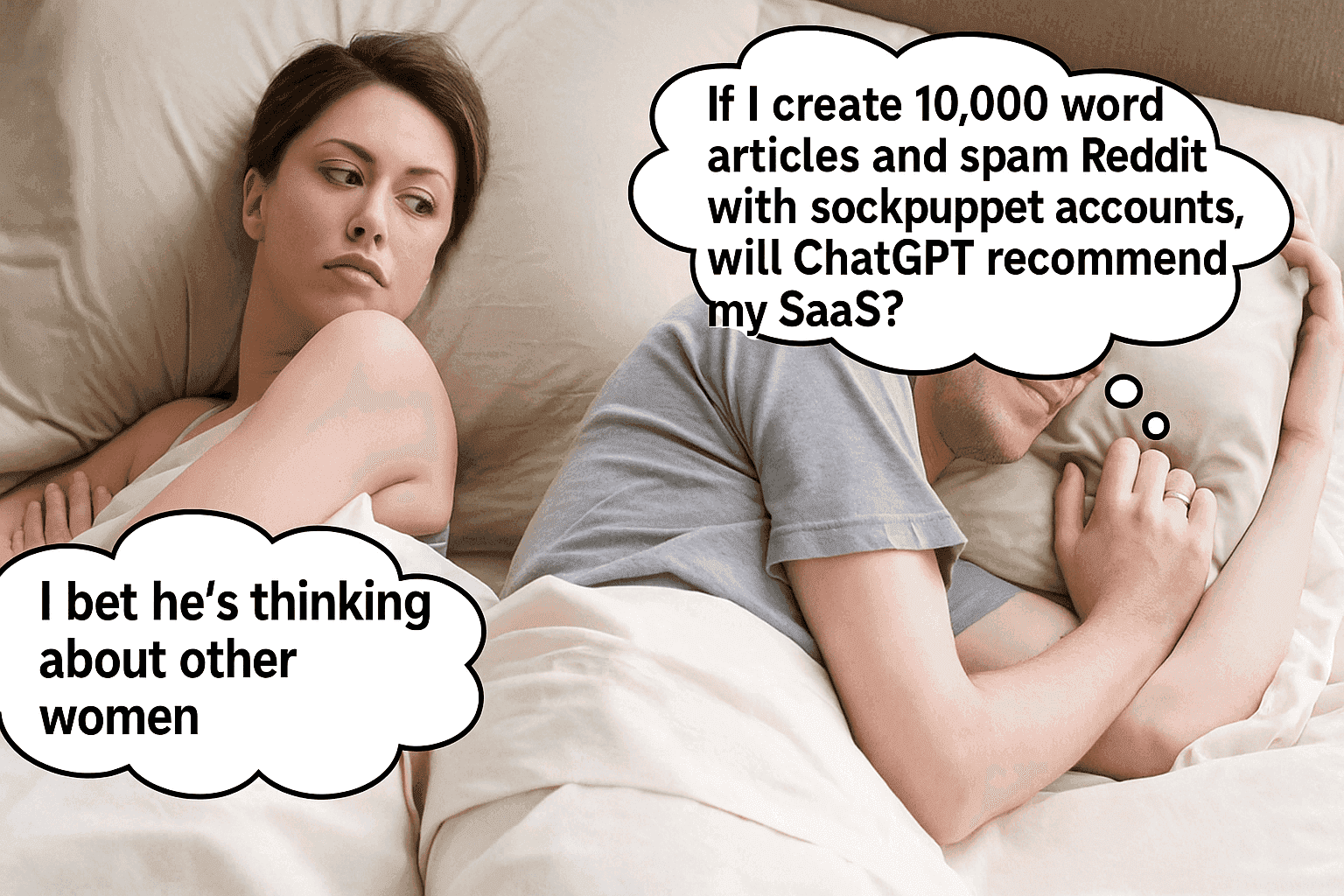
WarningReddit automation violates platform terms of service and risks permanent bans. The effectiveness reported here doesn't justify the ethical and legal risks.
But there's a slew of these platforms coming aloong, many of which you can find being launched on Reddit themselves.
Real Traffic Reports
A transcription platform owner dropped hard data:
*"AI assistants are sending more users than search engines. It started slowly - maybe 2-3% of traffic. Now it's 18% and climbing.
The kicker? These visitors convert at 2.4x our Google organic rate. They arrive pre-qualified from their AI conversation.
They've already decided they need our solution; they're just confirming we're the right choice. Our sales team loves these leads - they close themselves."*
This one claims traffic parity:
"One of my sites is getting equal traffic from Google and ChatGPT. Started tracking this in January when I noticed chatgpt.com in referrals. By March, it was 20% of organic. Now in October, it's dead even with Google. Sales are up 37% year-over-year with the same ad spend. ChatGPT sends fewer visitors but they buy more. Way more."
A damning data point from one source on AI writing:
"Posted 100 AI-generated blogs over 12 months. All passed AI detectors, all 1,000-5,000 words, all optimized for keywords. Current traffic: 127 visitors per month. Total. Across all 100 posts. It's embarrassing. Pure AI content without human insight is digital pollution. Google knows it, users know it, and my analytics definitely know it."
A picture draws a thousand words:
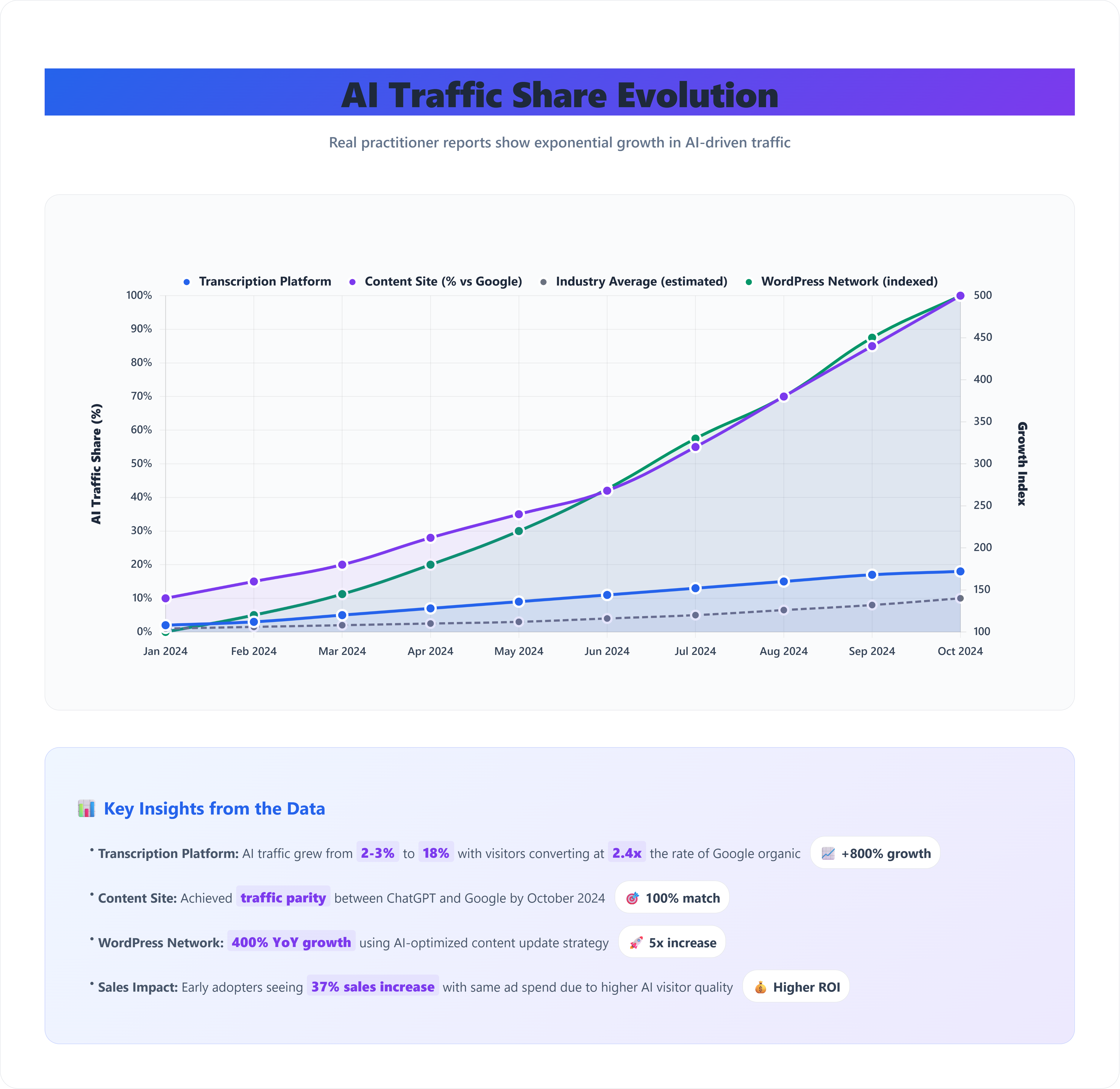
AlertPure AI-generated content consistently fails. The data shows -89% traffic performance compared to human-crafted content. Don't waste resources on AI content farms.
Changing the Content Strategy
Content depth emerged as the most controversial finding.
Critics called it "more everything" strategy. Supporters showed receipts:
*"We split-tested this across 20 articles in the same niche. Ten comprehensive guides at 8,000-12,000 words. Ten 'normal' posts at 2,000-3,000 words.
After three months: Long content averaged 72 ChatGPT citations per article. Short content averaged 3. Same domain, same author, same promotion. Only variable was depth. The AI seems to prefer exhaustive resources over concise answers."*
The most sophisticated strategy came from a WordPress operator managing four blogs:
*"I update existing posts rather than creating new ones. Google sees less risk in updated URLs. My process: Feed articles to GPT o1, generate 5-8 update ideas with detailed reasoning. Pick 2-3, generate new sections with GPT-4 for generic topics or Perplexity for fact-sensitive content.
Critical part: Schedule updates over 6 months. Creates impression of a 20-person team. In reality it's me, AI, and smart scheduling. Results visible in 1-2 weeks.
Traffic up 400% year-over-year."*
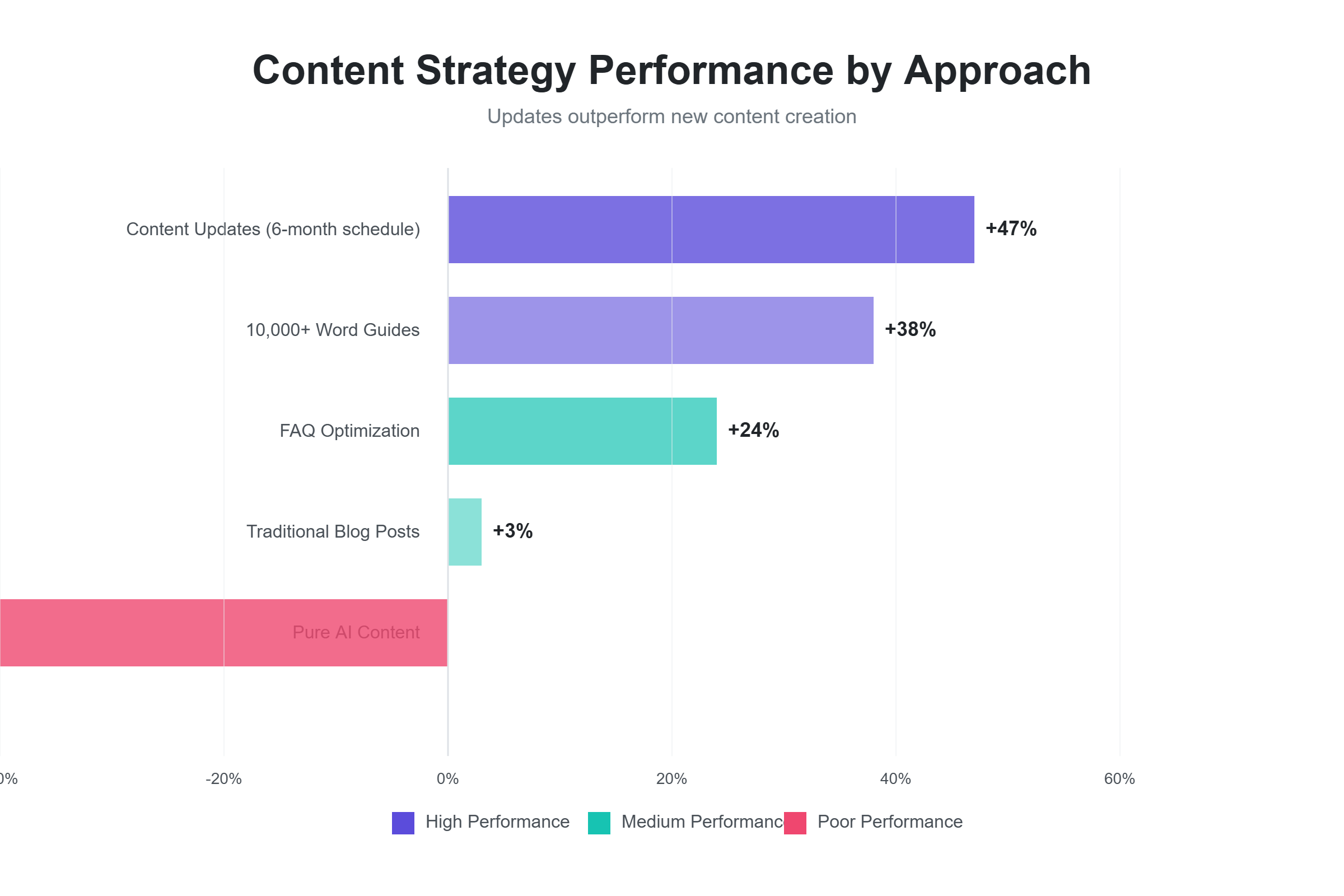
Crisis of Measurement
The fundamental problem:
*"You can track clicks from LLMs, but you will have no idea what the conversation was that led them there. With Google, I see 'best project management software' and know exactly what to optimize.
With ChatGPT, I see a click but the user might have asked 'what's a good alternative to Asana that doesn't suck and works with European privacy laws?' Good luck reverse-engineering that."*
The tracking landscape:
- Manual prompt checking: Labor-intensive, catches maybe 5% of mentions
- Parse.io and Peec: Mentioned repeatedly but nobody could provide working links
- UTM parameters: ChatGPT started adding them, others haven't
- Custom solutions: Expensive, complex, unreliable
A genuine technical breakthrough?
"The prompt in the AI is not the search query. User asks 'Show me the best SEO agencies in New York.' AI searches for 'top SEO company NYC 2024', 'SEO services Manhattan reviews', 'best search engine optimization firms New York'—completely different queries. That's why your traditional keyword tracking is worthless. You're optimizing for keywords nobody types anymore while AI creates its own query variations you can't predict."
TipStop thinking in exact-match keywords. AI systems generate multiple query variations from a single prompt. Optimize for topic clusters and semantic relationships instead.
Enterprise Nightmare: When Leadership Demands "AI SEO"
The most relatable thread started with a plea for help:
*"Boss wants to get an LLM SEO agency to boost LLM visibility. He read some LinkedIn article about 'GEO being the new SEO' and now wants to hire specialists. The consultants will probably hold some meetings, tell us stuff and put procedures in place, but they'll be out before we see any tangible results.
I'm fine with trying things out, but you know how SEO works. It's either you're early or you're late to the party and we can't afford to waste months on something that might or might not work."*
The responses revealed an industry-wide pattern:
- Executives reading one article and demanding immediate "AI optimization"
- Agencies selling unmeasurable services at premium prices
- Teams caught between skepticism and fear of missing out
- Zero reliable success metrics
One veteran's advice:
"Tell your boss to give you the agency budget for 3 months. Spend it on content depth, Reddit presence, and testing. You'll learn more than any 'GEO specialist' can teach because they're making it up as they go too. At least you'll own the learnings."
PPC Dooming
Paid search professionals face existential questions:
"Google's AI Overviews now show on commercial searches above ads. Yesterday I saw it on 'buy running shoes'—that's supposed to be sacred ad territory. If AI answers everything, what are we even bidding on? Ghost clicks? The chance that someone ignores the AI answer? CPCs are already insane. Add 65% zero-click searches and the whole model breaks."
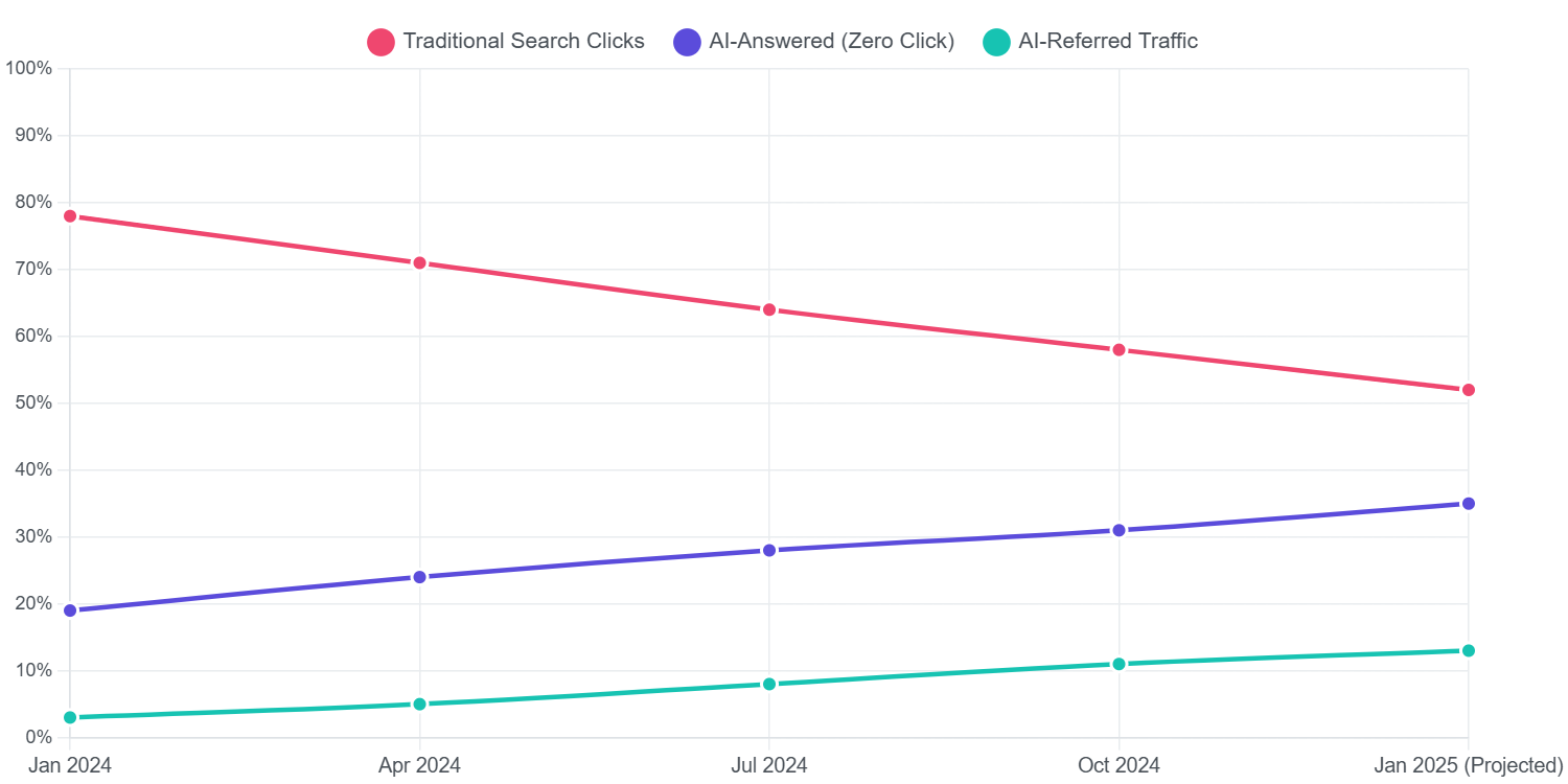
Technical Implementation Wars
Schema Battling
No topic generated more rage than schema markup:
The Believers:
*"Put FAQ schema at the end of articles. Generate the code with ChatGPT. Implement in HTML blocks. We tested this across 50 pages—FAQ schema pages got into AI Overviews 3x more than regular pages. It's not about Google understanding your content better.
It's about making it easier for AI to extract and cite specific answers."*
The Skeptics:
"LLMs are trained on Reddit where there's no schema. They parse human conversation, not structured data. You're optimizing for machines that turn sentences into mathematical tokens. Schema is WebDev cope for SEOs who can't write actual helpful content. Show me one LLM engineer who says schema matters. I'll wait." - u/Weblinkr
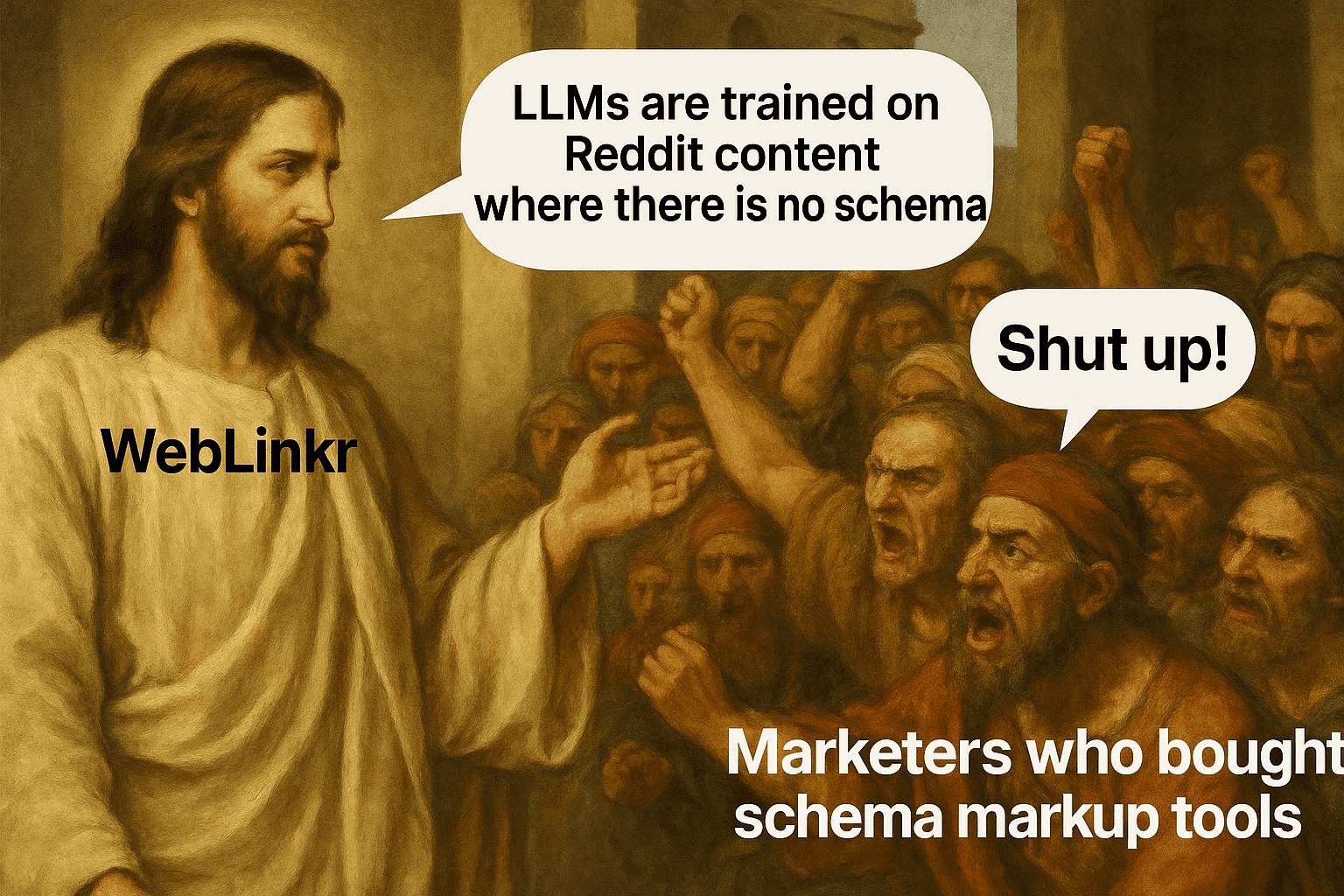
LLMs.txt?
A proposed standard similar to robots.txt for AI generated potentially useful results:
"Created LLMS.txt for all my sites. Format is simple—list your pages with AI-friendly descriptions. Cost nothing, took 20 minutes. Can't measure impact directly but I'm seeing more brand mentions in ChatGPT after implementation. Correlation or causation? No idea. But when the cost is zero and potential upside is traffic, why not?"
Only 4% of discussions mentioned LLMS.txt, suggesting minimal adoption despite potential benefits.
A Winning Playbook
After 1,000+ comments, clear patterns emerge:
Immediate Actions:
- Audit current AI visibility—search your brand across all major AI platforms
- Check robots.txt isn't blocking AI crawlers (happens more than you'd think)
- Start tracking referral traffic from AI domains
Content Evolution:
- Transform top pages into comprehensive resources (5,000+ words minimum)
- Add FAQ sections to every significant piece
- Update existing content on 3-6 month cycles
- Write conversationally—optimize for humans having AI conversations
Brand Building:
- Establish authentic Reddit presence in niche communities
- Generate brand mentions across diverse platforms
- Focus on thought leadership over link building
- Create content other sites naturally reference
Technical Optimizations:
- Implement FAQ schema (can't hurt, might help)
- Test LLMS.txt (zero cost experiment)
- Ensure fast load times (AI crawlers are impatient)
- Structure content for easy extraction
What Definitely Fails
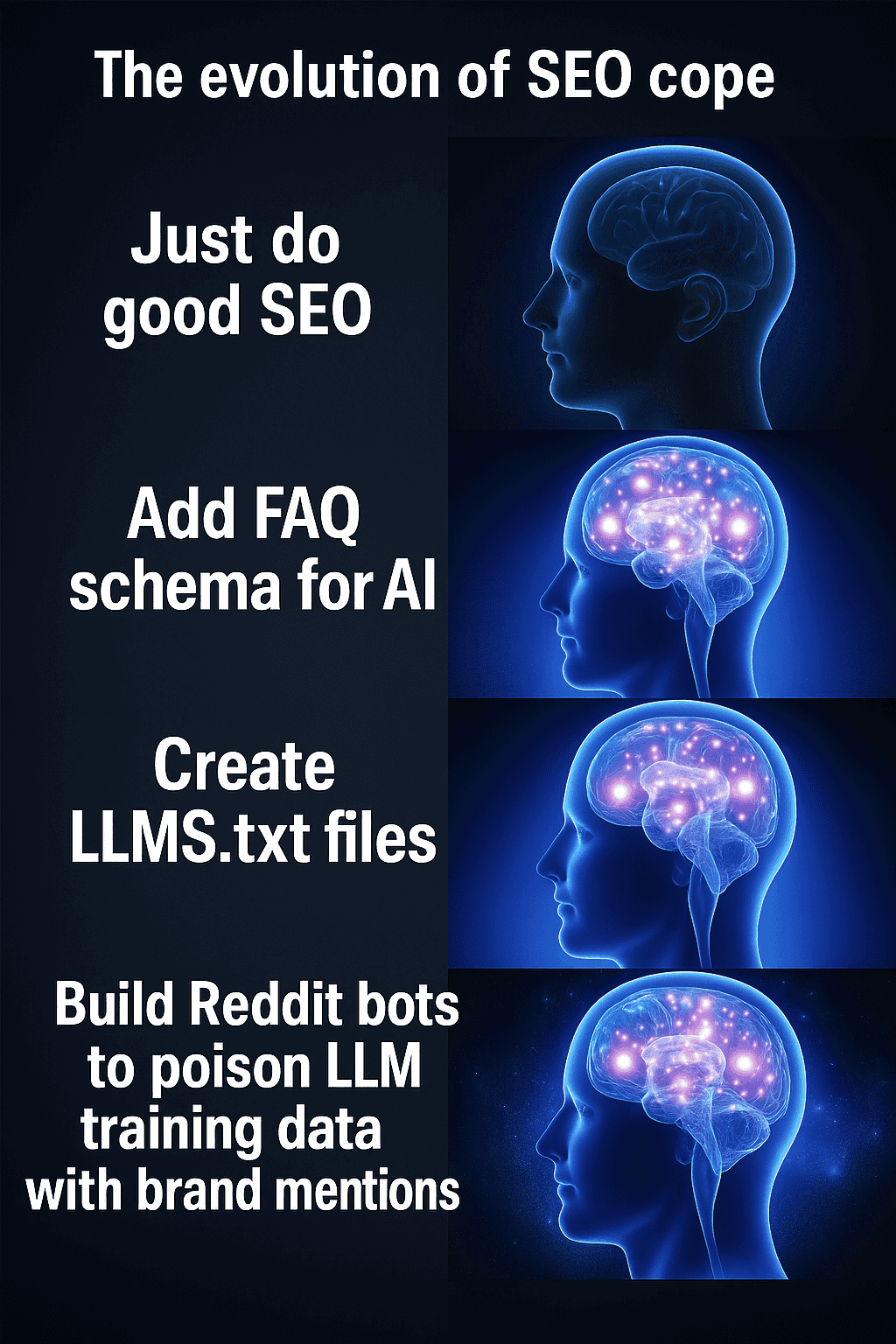
AlertCommunity consensus on guaranteed failures: Pure AI content, traditional link building for AI visibility, keyword density optimization, waiting for "official" guidelines, believing agency promises without proof, short thin content regardless of "optimization".
The Bottom Line
Three camps emerged from the analysis:
- Traditionalists (42%): "Just do good SEO"—they're not wrong, but missing opportunities
- Experimenters (18%): "Test everything"—seeing real results but can't always explain why
- Pragmatists (30%): "Adapt for conversational search"—probably the wisest approach
The truth incorporates all three perspectives. Traditional SEO provides foundation. Experimentation reveals new patterns. Pragmatic adaptation yields results.
Final wisdom from the threads: "It's not about choosing between SEO and 'GEO'. It's about understanding how human search behavior evolves and adapting accordingly. The brands winning aren't waiting for best practices. They're creating them."
References and Further Reading
Academic Research
- Stanford AI Lab (2023). "Foundation Models and Web Content Distribution"
- Cornell University (2023). "Large Language Models and Information Retrieval: Completeness Bias in RAG Systems"
- MIT CSAIL (2024). "Correlation Pitfalls in LLM Analysis"
- Northwestern Kellogg (2024). "AI-Mediated Consumer Behavior and Purchase Intent"
Industry Analysis
- Microsoft Research (2023). "Generative AI and Future Search Ecosystems"
- Gartner (2024). "Hype Cycle for Digital Marketing and AI Search Analytics"
- Search Engine Land (2024). "The State of AI Traffic Attribution"
Community Resources
- r/SEO LLM Discussion Megathread
- r/bigseo AI Traffic Case Studies
- r/TechSEO Query Fan-Out Analysis
Tools Mentioned
- Parse.io (unverified)
- Peec (unverified)
- TaskAGI (Reddit automation)
- LLMS.txt (llmstxt.org)
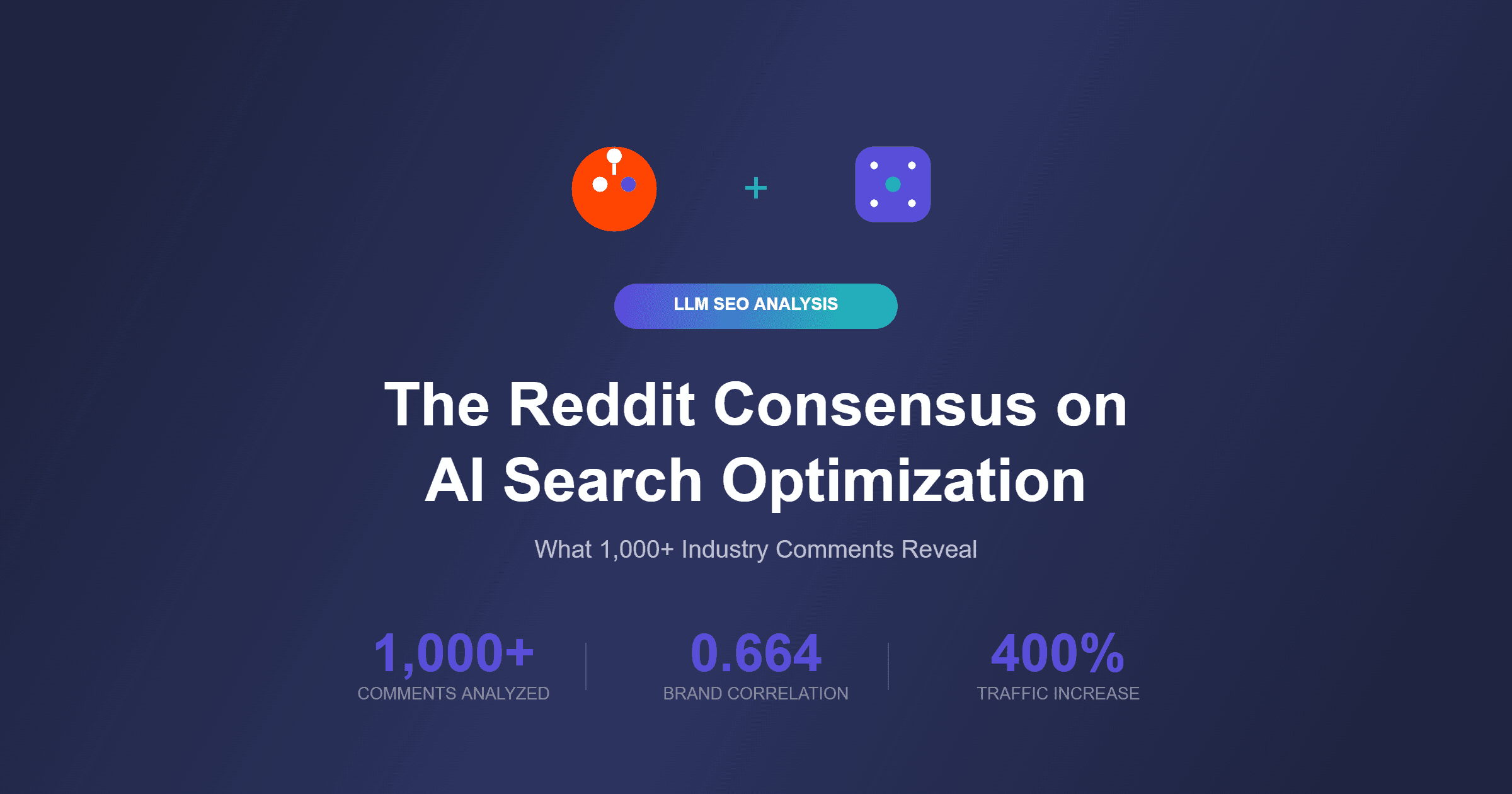
Join the Discussion
Comments from Disqus
Loading comments...
Comments with GitHub